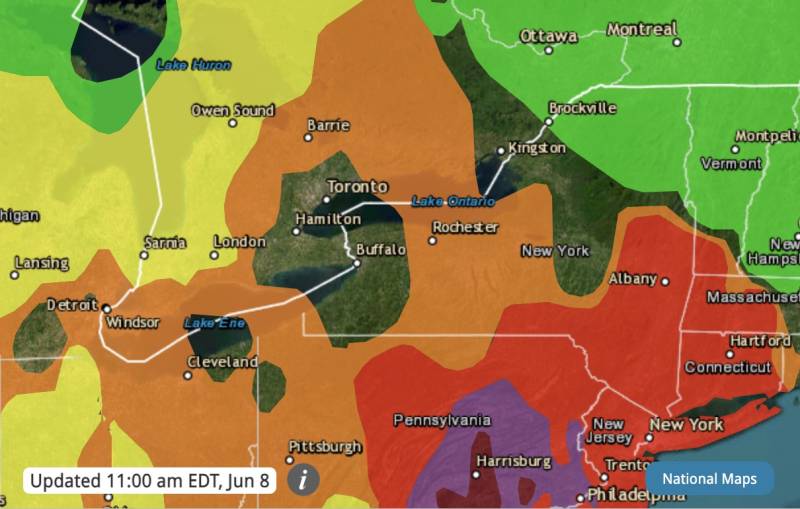
Genesee County, remains under an air quality health advisory, according to the Department of Environmental Conservation.
The air quality seems to have improved over a significant portion of Western New York, but Genesee County and further east is still a hazardous area, according to the most recent report.
The air quality in Genesee County is still considered hazardous, according to the DEC.
The DEC held a press conference this morning to brief the public on the ongoing air quality situation caused by wildfires in Canada.
Commissioner Basil Seggos, a DEC commissioner, said all of New York State, with the exception of the Adirondacks, are under a health advisory.
Downstate is hardest hit, followed by Central New York, and WNY is enduring fewer pollutant particles in the air.
"We don't expect any relief in sight from the fires that are burning across the provinces," Seggos said.
There is no rain in the forecast for Canada or New York until next week. The rain could help with firefighting and clearing the air.
McDonald called on New Yorkers to limit, if not eliminate, campfires and open burns.
"We urge all New Yorkers to limit outdoor activity," Seggos said. "It's unhealthy for all New Yorkers. There are some groups, of course, who will experience greater conditions, greater health conditions, as a result of the smoke. We also urge New Yorkers to limit any kind of campfires they are burning. Not only are you potentially exacerbating local air quality issues, but this is a very dry state. We've been tracking a very dry state now for many weeks. We're looking at a prolonged period of dryness, which of course, gives rise to fire conditions here in New York, and we don't need our first responders running around putting out fires in New York."
James McDonald, the commissioner of the DEC, said all New Yorkers should take care to avoid exposure to the outside air, which is filled with fine particles from the fires. He said vulnerable people should especially stay indoors. This includes, but is not limited to, people with existing lung disease, some with asthma, chronic obstructive pulmonary disease, people with heart disease, people with congestive heart failure, and people who have had a prior heart attack.
For those who feel the need for the protection, he recommended wearing an N-95 mask when walking outside.
"These masks do remove particles; they do remove air pollution, as some of you might remember from the pandemic," McDonald said. "N95 masks are sold at major big box hardware stores for a reason -- some people in the construction industry use masks like this because there are very effective at removing particles and keeping the air pollutant particles we're talking about, which are much larger than viral particles."
To get updates on air quality, he recommended visiting airnow.gov.
